At least 85 people have been killed and hundreds injured in a crush at a cash distribution event in Yemen, as the impoverished country suffered one of its worst tragedies just as optimism was growing over its bitter civil war.
Three people were detained over the stampede in Sanaa, Yemen's rebel-held capital, after large crowds gathered at a school to receive gifts of 5,000 rial (€7.30) for the end of Ramadan, the Muslim holy month.
Harrowing footage screened by the Iran-backed Huthi rebels' Al Masirah TV showed a tightly packed crowd screaming and shoving, unable to move, while others attempted to haul stricken people out of the crush.
Other shots showed dead bodies on the ground as the panic continued.
Afterwards, piles of abandoned sandals, clothing and a crutch littered the scene, while an investigator in white protective gear collected evidence.
"It was a huge crowd. They fell on me, and I got hurt," an injured child told Al Masirah from his hospital bed.
A Huthi security official said that at least 85 people were killed and "more than 322" injured, 50 of them seriously.
"Women and children were among the dead," the official said. A health official confirmed the toll.
The tragedy comes just ahead of Eid al-Fitr, a major Muslim festival, and punctures a buoyant mood over the war in the Arabian Peninsula's poorest country, following peace talks and an exchange of nearly 1,000 prisoners last week.
Two thirds of the population need help in the war-torn country, which was impoverished even before the conflict erupted eight years ago.
The Huthis, who seized Sanaa in 2014, are fighting a military coalition led by Saudi Arabia that intervened in March 2015 in an attempt to reinstall the ousted government.
Hundreds of thousands of people have been killed by the war's direct or indirect causes, and millions pushed to the brink of famine.
But momentum is growing for a truce and peace process, with the Saudis and Huthis holding talks last week.
We need your consent to load this rte-player contentWe use rte-player to manage extra content that can set cookies on your device and collect data about your activity. Please review their details and accept them to load the content.Manage Preferences
'People flocked in a huge way' - witness
Eyewitnesses said gunfire sparked a stampede after crowds gathered at the school, in Sanaa's historic Bab Al-Yemen district, to receive the handouts from a businessman.
The head of the Huthis' Supreme Revolutionary Committee, Mohamed Ali al-Huthi, blamed "overcrowding", saying people were packed in a narrow street leading to the school's back entrance.
Once the gates opened, the crowd streamed into a tight staircase leading to the courtyard where the distribution was taking place.
"Citizens were informed a week ago that sums of money would be disbursed without ID verification," said one witness.
"People flocked in a huge way, the gate opened, and with the large numbers, the stampede happened."
The Huthis' political chief Mahdi al-Mashat said a committee had been formed to investigate, and a Huthi security official said three people had been detained on suspicion of involvement.

After the stampede, families converged on hospitals but many were not allowed to enter as senior officials were also visiting the dead and wounded.
At the school, heavily deployed security forces were seen blocking relatives from entering the facility to locate family members.
Footage from one hospital showed dazed and bandaged survivors recovering in a ward, some with visible wounds on their limbs and heads.
Yemen is no stranger to tragedy, most stemming from its brutal war.
The country has been mired in an eight-year conflict that pits a military coalition led by Saudi Arabia against the Iran-aligned Houthi group.
The war has killed tens of thousands of people, wrecked the economy and pushed millions into hunger.
In 2016, a coalition air strike killed more than 140 people attending a funeral, and dozens of children died in a strike on a bus in 2018.
At least 70 people died in an air strike on a prison in Saada, the Huthis' home city, in January 2022.
In March 2021, 45 people were killed in a blaze at a Sanaa migrant centre caused by Huthi forces firing teargas canisters.
The conflict has widely been seen as a proxy war between Saudi Arabia and Iran.
Riyadh and Tehran in March agreed to restore diplomatic ties severed in 2016 and prisoner exchanges this month between the two sides have raised hopes of a resolution to the conflict.
'Great tragedy'
"We are experiencing a great tragedy, a large number of our citizens have died during this stampede," said Abdulaziz Bin Habtour, the prime minister of the Houthi movement, de facto authorities in north Yemen.
In remarks published by the group's media centre, he said measures would be taken to "find a serious solution so it does not happen again". The president of the supreme judicial council said the necessary legal measures would be taken.
The United Nation's World Food Programme feeds 13 million in Yemen, but funding shortfalls have reduced its activities.
An expired UN-brokered truce has delivered a year of relative calm, the longest stretch in the conflict, and Saudi Arabia and the Houthis are engaged in talks in parallel to UN efforts to establish a permanent ceasefire.

